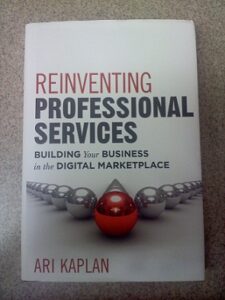
Ari Kaplan’s new book, Reinventing Professional Services: Building Your Business in the Digital Marketplace addresses the question of how professionals can integrate new technologies into their businesses to be more influential and effective. Loaded with resources and stories from professionals in all industries, Ari’s book provides suggestions about how to use social media, blogging, e-newsletters, and video/audio recordings that makes them less daunting.
As I read this book, I reflected on the legal profession, which has the stereotypes of being dignified and particular, and where deviating from the norm is often frowned upon. Many lawyers and law firms shy away from online resources and tools. Perhaps this is because of the strict rules in the profession about advertising and soliciting clients, or because members the profession have a low tolerance for making mistakes.
I’ve compiled the top five lessons lawyers can integrate from this book into their professional lives.
1.      Social Media is a Tool, not the Goal.
It seems that a lot of professionals think that having a Facebook page, a Twitter profile, or a blog is enough, but then they never use them. Doing this is like buying a hammer and never building anything. These professionals do not understand that these are tools to communicate more effectively with other professionals and clients. These are merely channels to “cultivate relationships.â€Â These are fantastic tools for building trust by being genuine and consistent. Using these tools is not a one-time event; it requires “habitual participation.â€
2.      Be a “Visible Enthusiastic Expert.â€
This is one of the best lessons I took from this book. Being a visible enthusiastic expert means being part of the online conversation on topics where you have interest and expertise. It’s important to contribute “rich content†and to convey your passion. Conversing with other experts in an online forum is an effective way to become associated with them. Even the simple act of sharing a link to another’s work shows that you are aware and informed about a topic. Additionally, being transparent about who you are and what you can do without being a salesperson conveys to others that you care about a particular issue or population.
 3.      Pick Your Targets.
3.      Pick Your Targets.
Having a solid online presence is a good start, but it’s not the end. When there are people you want to connect with, you have to reach out to them. Don’t wait for them to find you. Websites like LinkedIn, Twitter, and Google+ are instant ice-breakers for introducing yourself to new people. They provide comfortable opportunities to ask a person for advice or for an informational interview. If your first attempt at interaction fails to produce the desired result, be sure to follow up.
4.      Do Not Be Afraid to Fail.
Law students are instilled with the notion that they must always be perfect – perfect appearance, perfect cover letters, perfect work product, etc. They graduate thinking the worst thing they could do is misspell a word on an email. This can make them gun shy to try new things. Ari’s book demonstrates that most of these new tools are easier to use than you think. He encourages readers to consider who they want to connect with, where they are interacting, and to join the conversation. He promises that you will fail some of the time, and that’s ok.  If you try using an e-newsletter and it doesn’t work for you, you can use another tool like blogging or LinkedIn to reach your audience. Figuring out what works for you and your business is part of the process.
5.      Never Forget the Value of In-Person Contact
Using technology to communicate with someone is less intimidating than picking up the phone; however it is more impersonal. Nothing will ever replace face-to-face contact, which is more personal and memorable. It is important to look for opportunities to meet people in person whenever possible and to continue to build relationships with thoughtful follow up.
Using these tips and tools requires willingness and commitment. The potential benefits of using technology should overpower any fears that come with trying new things. Always keep in mind that these tools are to facilitate interaction, not for self-promotion.
Ari Kaplan, a Fastcase50 honoree, is the principle of Ari Kaplan Advisors in New York City and the author of The Opportunity Maker, Strategies for Inspiring Your Legal Career Through Creative Networking and Business Development (Thomson-West, 2011). I bartered this blog post in exchange for a copy of his new book.Â
Related articles
- 81% of LinkedIn Users Belong to a LinkedIn Group [Data] (hubspot.com)
- Social Media: An Essential Communication Channel (avaya.com)




